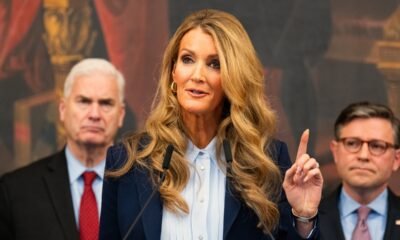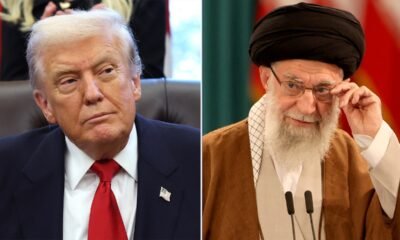INTERNACIONAL
Canada to open Greenland consulate after Trump’s push to acquire island
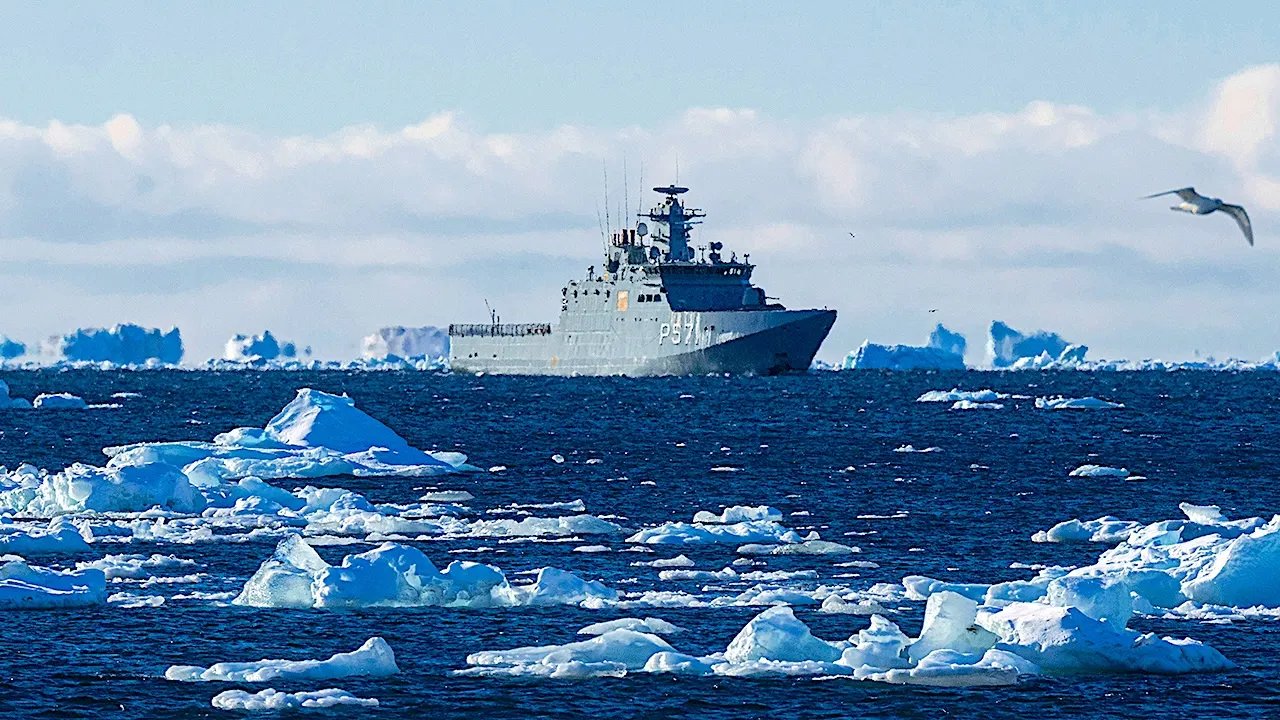
NEWYou can now listen to Fox News articles!
OTTAWA: Canada will soon open a consulate in Nuuk, the capital of Greenland – the world’s largest island and an autonomous dependent territory in the Kingdom of Denmark that President Donald Trump has talked about the U.S. acquiring along with Canada as the 51st state.
Canadian Foreign Affairs Minister Anita Anand told CBC News that Canada’s new diplomatic presence in Greenland is «unprecedented in terms of expanding our Arctic footprint» and that Canada is playing its «part as a significant Arctic country in a time where the geopolitical environment is volatile.»
Having hosted a two-day meeting of G7 foreign ministers earlier this week, including Secretary of State Marco Rubio, in the Ontario town of Niagara-on-the-Lake, Anand was unavailable for an interview. However, her press secretary, Myah Tomasi, told Fox News Digital that the consulate, the building of which Canada will share with Iceland, will have a major focus on Arctic security, which both Anand and Rubio have «talked extensively» about through the lens of Canada and the U.S. as «willing partners.»
Anand’s initial trip to open the consulate on Thursday was canceled because of bad weather, but she is expected to visit the island soon.
FRANCE WARNS OF GLOBAL ‘BRUTALIZATION’ AMID TRUMP ARCTIC DISPUTE OVER GREENLAND
Traditional Greenlandic housing is seen from the Myggedalen viewpoint on March 28, 2025 in Nuuk, Greenland. (Leon Neal)
On his way to the G7 leaders’ summit in Canada in June, French President Emmanuel Macron stopped in Greenland, where he said that the Arctic island «is not to be sold, not to be taken,» and while addressing Greenlanders said that «when a strategic message is sent to you» – without directly mentioning President Donald Trump’s aspirations – «it’s literally perceived by the Europeans as targeting a European land.»
Last December, the Canadian government – under then-Prime Minister Justin Trudeau – unveiled an Arctic foreign policy, which included plans to open consulates in both Nuuk and Anchorage. No date has been set for the Canadian diplomatic mission in Alaska’s largest city.
Alex Dalziel, a senior fellow with the Macdonald-Laurier Institute, an Ottawa-based think tank where he focuses, in part, on Arctic security issues, told Fox News Digital that Canada’s decision to open the consulate in Greenland should not be construed as «a poke in the eye» of the U.S. after Trump suspended trade talks with Canada last month following an Ontario anti-tariff ad featuring former President Ronald Reagan.

U.S. Vice President JD Vance poses with second lady Usha Vance, former National Security Advisor Mike Waltz and his wife and Secretary of Energy Chris Wright as they tour the U.S. military’s Pituffik Space Base in Greenland on March 28, 2025. (Jim Watson/Pool via Reuters)
US TURNS TO FINLAND TO CLOSE ARCTIC ‘ICEBREAKER GAP’ AS RUSSIA, CHINA EXPAND POLAR PRESENCE
«This is Canada taking the North American Arctic more seriously and getting some of the political and diplomatic pieces in place,» said Dalziel.
«Anything Canada does in the Arctic to strengthen its security has the knock-on effect of strengthening U.S. security.»
Last month, Trump announced that four companies – one each in the U.S. and Canada, and two in Finland – were selected to design and build six Arctic icebreakers.
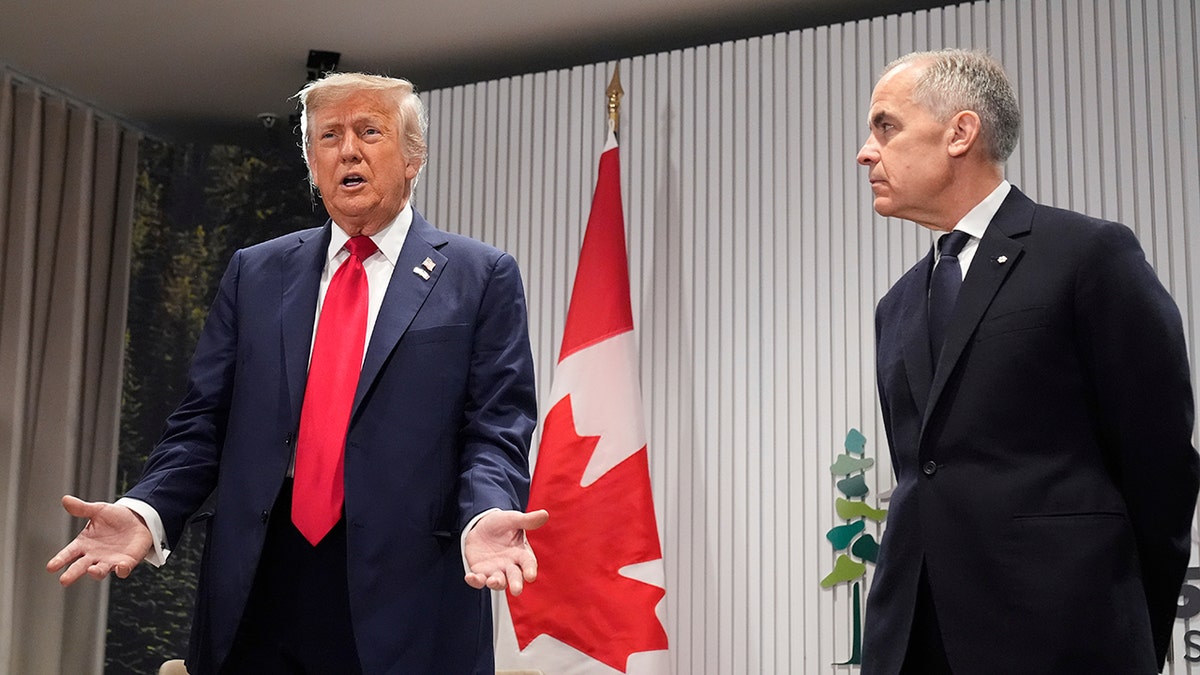
President Donald Trump speaks during a meeting with Canada’s Prime Minister Mark Carney on the sidelines of the G7 Summit, Monday, June 16, 2025, in Kananaskis, Canada. (AP Photo/Mark Schiefelbein)
The U.S. has had a consulate in Nuuk since 2020, after the first one, which opened in 1940 following the Nazi occupation of Denmark, closed in 1953.
But in advancing its economic interests in Greenland, Canada will have an advantage over the U.S. «given the connections between the peoples of Greenland and Canada,» according to Dalziel.

Military vessel HDMS Ejnar Mikkelsen of the Royal Danish Navy patrols near Nuuk, Greenland, Wednesday, March 5, 2025. (Evgeniy Maloletka/AP Photo)
CANADIAN PM MAKES VEILED DIG AT TRUMP DURING FILM FESTIVAL, WARNS NOT TO PUSH ‘TOO FAR’
The Inuit comprise most residents of both Greenland and Nunavut, Canada’s largest and northernmost territory, which shares a border of less than a mile with Greenland on the uninhabited Hans Island – also known as Tartupaluk in Greenlandic.
Canada’s Arctic foreign policy commits to implement a boundary agreement between Canada and Denmark regarding the island – and to also begin boundary negotiations with the U.S. regarding the Beaufort Sea, which is north of Alaska and two of Canada’s northern territories.
«There have been overlapping claims between Canada and the U.S.,» explained Dalziel about a decades-long dispute over a section of the sea.
«There was some progress in the Biden administration to advance discussions, but in the current context I think it’s unlikely to make progress,» said Dalziel.
CLICK HERE TO DOWNLOAD THE FOX NEWS APP
«Canada and the U.S. have lived with this, as they have with their disagreement over the status of the Northwest Passage – whether it’s an internal historic waterway as Canada claims, or an international strait as the U.S. does.»
greenland,canada,donald trump,mark carney,emmanuel macron
INTERNACIONAL
Elecciones en Japón: el partido de la primera ministra Sanae Takaichi se encamina a recuperar una amplia mayoría en el Parlamento

El partido de la primera ministra japonesa, Sanae Takaichi, parecía haber conseguido una mayoría por sí solo en una elección parlamentaria clave el domingo, según la televisora pública NHK y otras grandes cadenas, que citaron los resultados de sus encuestas a pie de urna.
NHK dijo que la coalición gobernante de Takaichi, liderada por su Partido Liberal Democrático, podría lograr más de dos tercios de los 465 escaños de la cámara baja, la más poderosa del parlamento bicameral del país.
Takaichi es enormemente popular, pero el Partido Liberal Democrático, que ha gobernado Japón durante la mayor parte de las últimas siete décadas, ha enfrentado escándalos de financiación y religiosos. La mandataria convocó las elecciones anticipadas el domingo apenas tres meses después de asumir el cargo, con la esperanza de cambiar esa situación antes de que su popularidad se desvanezca.
El gran incremento respecto a los comicios previos podría permitir a Takaichi avanzar en una agenda de derecha que busca promover la economía y las capacidades militares de Japón mientras aumentan las tensiones con China. También quiere cultivar lazos con su crucial aliado, Estados Unidos, y un a veces impredecible presidente Donald Trump.
La ultraconservadora Takaichi, quien asumió el cargo en octubre como la primera mujer gobernante de Japón, prometió “trabajar, trabajar, trabajar”, y su estilo, que se considera desenfadado y duro a partes iguales, ha movilizado a seguidores más jóvenes.
En las encuestas previas a la votación apuntaban a una victoria aplastante en la cámara baja para el PLD. A pesar de la formación de una nueva alianza centrista y un auge de la extrema derecha, la oposición se considera demasiado fragmentada para plantear un verdadero desafío.
Takaichi aspiraba a que su partido, junto con su nuevo socio, el Partido de la Innovación de Japón, lograra una mayoría en la cámara baja de 465 escaños, la más poderosa del Parlamento bicameral de Japón.
Encuestas recientes realizadas por los principales periódicos japoneses muestran la posibilidad de que el partido de Takaichi pueda ganar una mayoría simple por sí solo, mientras que su coalición podría obtener hasta 300 escaños, un gran salto con respecto a la escasa mayoría que tenía desde su derrota electoral en 2024.
Si el PLD no logra ganar una mayoría, “renunciaré”, afirmó.
Una gran victoria de la coalición de Takaichi podría suponer un importante giro a la derecha en las políticas de seguridad, inmigración y otras en Japón. Hirofumi Yoshimura, líder del socio conservador JIP, dijo que su partido servirá como un “acelerador”.
El país ha visto recientemente cómo los populistas de extrema derecha ganan terreno, como el partido nacionalista antiglobalista en ascenso Sanseito.
Takaichi prometió revisar las políticas de seguridad y defensa para diciembre con el fin de reforzar las capacidades militares ofensivas de Japón, levantando una prohibición sobre las exportaciones de armas y alejándose aún más de los principios pacifistas de posguerra del país.
Ha impulsado políticas más estrictas con respecto a los extranjeros, las medidas contra el espionaje y otras favorecidas por los votantes de extrema derecha, pero que, según los expertos, podrían socavar los derechos civiles.
Takaichi también quiere aumentar el gasto en defensa en respuesta a la presión de Trump para que Japón relaje sus restricciones presupuestarias.
Aunque Takaichi dijo que busca un mandato público para sus “políticas divisorias”, evitó entrar en detalles como las formas de financiar el creciente gasto militar, cómo resolver la tensión diplomática con China y otros temas controvertidos.
En sus discursos de campaña, la primera ministra habló con entusiasmo sobre la necesidad de un gasto gubernamental “proactivo” para financiar “inversiones en gestión de crisis y crecimiento”, como medidas para fortalecer la seguridad económica, la tecnología y otras industrias. Takaichi también busca impulsar medidas más estrictas sobre la inmigración y los extranjeros, que incluyen requisitos más duros para los propietarios foráneos y un límite al número de residentes de otros países.
La elección anticipada después de solo tres meses en el cargo “subraya una tendencia problemática en la política japonesa en la que la supervivencia política tiene prioridad sobre los resultados de políticas sustantivas”, dijo Masato Kamikubo, profesor de política de la Universidad de Ritsumeikan. “Siempre que el gobierno intenta reformas necesarias pero impopulares… se avecina la próxima elección”.
Hay algunas incertidumbres. La elección convocada apresuradamente que dio poco tiempo para que la gente se preparara ya ha invitado a quejas.
La votación del domingo también comenzó bajo una nueva nevada en todo el país, incluida Tokio. El norte de Japón ha registrado nevadas récord en las últimas semanas que provocaron bloqueos en carreteras y docenas de muertes, y se teme que las ventiscas puedan obstaculizar la votación o retrasar el conteo de votos en las áreas más afectadas. Cómo se traducirá su popularidad en votos entre los votantes más jóvenes, notorios por su baja participación, durante el mal tiempo es impredecible.
Aún así, Kazuki Ishihara, de 54 años, dijo que votó por el PLD por estabilidad y con la esperanza de algo nuevo bajo Takaichi. “Tengo algo de esperanza de que ella pueda hacer algo” que sus predecesores no pudieron.
Un oficinista de 50 años, Yoshinori Tamada, dijo que su interés son los salarios. “Pienso mucho cuando miro mi nómina, y emití mi voto por un partido en el que creo que puedo confiar en ese sentido”.
(con información de AP)
Asia / Pacific
INTERNACIONAL
West Virginia worked with ICE — 650 arrests later, officials say Minnesota-style ‘chaos’ is a choice
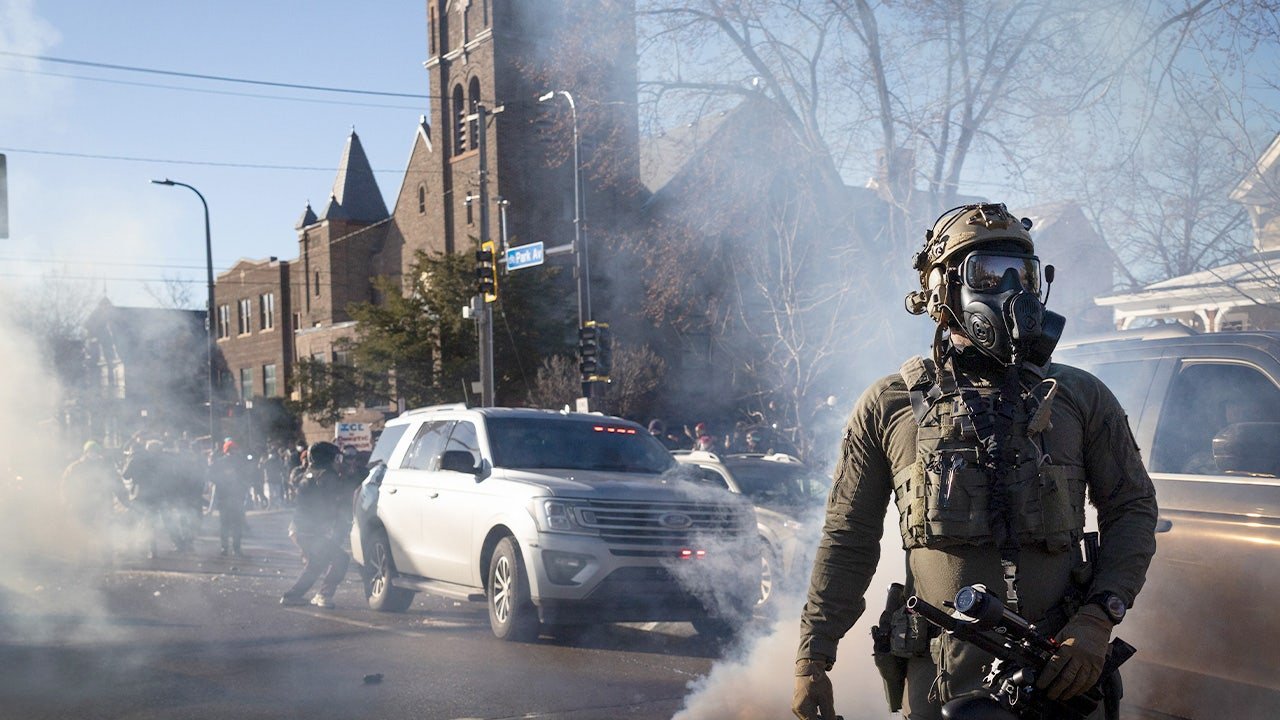
NEWYou can now listen to Fox News articles!
A relatively brief, but lucrative ICE surge into West Virginia netted roughly 650 illegal immigrant arrests earlier this month — a two-week, statewide operation officials say unfolded with little disruption and now stands as a counterpoint to the turmoil surrounding similar enforcement efforts in Minnesota.
From Jan. 5 through Jan. 19, federal agents fanned out across the Mountain State — at times working with local law enforcement — targeting illegal immigrants with criminal histories or prior deportation orders, DHS officials told Fox News Digital.
Officials involved contrast the West Virginia operation with recent tensions in Minnesota, where ICE-related enforcement actions have sparked sustained protests, surveillance of federal agents and confrontations with law enforcement.
«I think the most important thing to notice here is that West Virginia and similarly situated states … have made it very, very easy for criminal illegal aliens to be picked up and processed by ICE,» West Virginia Attorney General JB McCuskey told Fox News Digital in an exclusive interview.
MANY OF AMERICA’S SAFEST CITIES ARE IN JURISDICTIONS THAT COOPERATE WITH ICE
West Virginia Attorney General JB McCuskey speaks outside the Supreme Court. (Oliver Contreras/Getty Images)
Some of the operations even reached the state’s bluer-tinged Eastern Panhandle, the fast-growing exurb of Washington, D.C., where officials say cooperation, not confrontation, defined the response.
There, Jefferson County Sheriff Thomas Hansen confirmed a two-week operation with ICE in his jurisdiction, which includes Charles Town, Harpers Ferry and Summit Point.
«The (JCSO) was impressed with the professionalism and work ethic of the agents and how well they interacted with the citizens and local law enforcement officers,» Hansen said in a statement obtained by Fox News Digital.
McCuskey said the lack of disruption in West Virginia reflected a cooperative approach that he argued prevented the kind of disorder seen elsewhere.
«When you contrast that with places like Minnesota, where you have Keith Ellison — who’s obviously embroiled in a massive fraud scandal involving Somali immigrants, et cetera, what you see is riots and violence,» he said.
McCuskey suggested the West Virginia mission shows Minnesota’s leadership can no longer blame federal law for its approach, noting that all states still operate under the same immigration statutes that have remained intact since the Obama administration.
TRUMP’S IMMIGRATION VICTORY IN A MINNESOTA COURT IS A WIN FOR ALL LAW-ABIDING CITIZENS

An ICE agent is seen standing in front of a house in a residential area. (Victor J. Blue/Bloomberg via Getty Images)
«All God-fearing Americans believe in immigration. We believe that the promise of this country should be available to those who want to come to America the right way, follow our laws, and become great parts of this incredible quilt that is the American experience,» McCuskey said.
«And if your first act as a hopeful new American is to break our laws, that trust has been broken.»
McCuskey also accused Minnesota’s leadership of failing on parallel issues, calling Ellison «dalliant» in confronting social services fraud.
«My office [oversees] the same things,» he said, noting West Virginia also has a high proportion of residents on entitlements but lacks the level of fraud he says plagues Minnesota.
Just across the Potomac River from ICE’s Martinsburg sting, Maryland Democrats lambasted ICE’s presence in Washington County.
ICE REVEALS ‘WORST OF THE WORST’ ARRESTS IN JUST ONE DAY AFTER ROUNDING UP ‘THUGS’ CONVICTED OF VILE CRIMES

ICE officers arrested Sagar Singh, an Indian national previously ordered removed, during Operation ICE Wall after he was stopped for failing to clear a mandatory commercial vehicle brake check. (ICE)
McCuskey called that a «representation of the generalized idiocy of most of the Democrats in Congress, who have sat on their hands for the last 25 years and done nothing about the very immigration laws that they’re very angry about being enforced.»
Ellison, by contrast, showered protesters with praise at a recent public appearance, calling ICE’s operations a «federal invasion» and telling those assembled in the Twin Cities that he «wanted you to know that I was here with you, fighting with you, standing with you. Keep fighting, stand up strong, don’t back down.»
Fox News Digital reached out to Ellison and Gov. Tim Walz for comment, but neither office responded. DHS officials, however, said they expect states that cooperate with ICE to see similar success to West Virginia.
Assistant Secretary Tricia McLaughlin said «work[ing] together can make America safe again.»
DHS told Fox News Digital of similarly low-profile ICE operations in Alabama, including activity near Birmingham that netted a violent illegal immigrant accused of stabbing a federal agent, along with enforcement actions in other cities reported by local media.
Alabama Gov. Kay Ivey and Sen. Tommy Tuberville told Fox News Digital they will continue to welcome federal agents in the Yellowhammer State, with Tuberville, a candidate for governor, quipping that one mayor who has pledged to protect illegal immigrants «won’t like me very much» if he succeeds Ivey.
Those arrested in the West Virginia sweep included Mexican national Enrique Vergara — convicted of assault with a weapon — Guatemalan national Isaias Santos — convicted of several violent charges — Julian Garza, charged with auto theft; Brayan Canelis-Giron, charged with domestic violence and gun offenses; and Dennis Paz-Vallecillo, convicted of child neglect.
Not every Mountaineer leader was on board, however, as WVDP Chair Mike Pushkin — a state delegate from Kanawha County — told Fox News Digital people «have to be honest about what’s really going on here.»
FROM PROTEST TO FELONY: THE LINES MINNESOTA ANTI-ICE AGITATORS MAY BE CROSSING

Minnesota Attorney General Keith Ellison had previously come under fire from Republicans for his ties to climate groups before the massive welfare and social services fraud scandal rocked the state. (Chip Somodevilla/Getty Images)
«The difference between what you’re seeing in Minnesota and what’s happening in West Virginia isn’t complicated — it’s courage,» Pushkin said, crediting Minnesota leaders with standing up to President Donald Trump «trampl[ing] due process and ignor[ing] the Constitution.»
«Republican leaders here won’t even clear their throats — and trying to compare the size and scope of the Minnesota operation to what happened here is just silly. That’s like comparing a house fire to a burnt piece of toast and pretending they’re the same emergency,» he said.
Pushkin cited a Clinton-appointed judge’s order that some of the detainees be released, including two men picked up on the West Virginia Turnpike.
«In the court’s words, there wasn’t ‘a shred of evidence to justify the government’s position’ — that should be the headline. That should alarm anyone who cares about freedom or the rule of law,» Pushkin said.
«Minnesota leaders pushed back. West Virginia’s Republican leadership just clicked their heels, saluted, and fell in line.»
HOMAN ANNOUNCES DRAWDOWN OF FEDERAL PRESENCE IN MINNESOTA, HAILS ‘UNPRECEDENTED COOPERATION’ FROM LOCAL POLICE
Fox News Digital also asked several blue-state leaders about the cooperation contrast but heard back from only one.
A spokeswoman for California Gov. Gavin Newsom said that if the feds truly cared about getting «hardened criminals off our streets, they would pick up every person released from our state prisons that have immigration detainers placed on them.»
CLICK HERE TO DOWNLOAD THE FOX NEWS APP
Diana Crofts-Pelayo said there’s only a one-in-eight rate in that regard, which she said shows the Trump administration just wants to «cause panic and fear to ultimately ensure compliance to a dangerous immigration agenda that threatens Americans’ safety, affordability and freedom.»
A California source familiar with the immigration enforcement dynamic there said that immigrants who commit crimes are subject to certain exceptions that do allow local law enforcement cooperation with ICE, particularly those charged with a violent felony.
DHS said that cooperation with federal law enforcement is the safest and most effective option for state officials.
«Sanctuary politicians who refuse to cooperate with DHS law enforcement are wasting law enforcement time, energy, and resources, while putting their own constituents in danger,» McLaughlin told Fox News Digital, crediting West Virginia officials with allowing such a quick and effective operation and expressing hope that other states would follow suit.
illegal immigrants,west virginia,immigration,minnesota fraud exposed,politics
INTERNACIONAL
¿Qué nombre le ponemos a la era histórica que estamos viviendo?

¿Cómo la llamaremos? En lo personal ya no tengo dudas de que está vinculada a la presencia o retorno de la geopolítica, nombre que, como tantas otras denominaciones, proviene del griego antiguo, combinando las palabras política y tierra. A pesar de carecer de una definición compartida por todos, se refiere a las relaciones de poder entre Estados, aplicándose también a las relaciones internacionales, y con indiferencia de la escala, se ocupa de las estrategias, preferentemente las que se relacionan con soberanía, territorios, intercambios económicos y posibles conflictos. En general, permite tomar decisiones utilizándose escenarios posibles para que la acción política pueda orientarse hacia futuros acontecimientos.
Sin duda vivimos una época de cambios, cambios profundos. “Ponerle un nombre nos aleja, tanto de la nostalgia por un pasado que desaparece como también de la Trumpmanía, es decir, la total dependencia ya sea de amor u odio a su persona, permitiéndonos abrir la mente a lo nuevo que se acerca y huir de la trampa de llamar a esta era post-algo, que en definitiva no explica nada y hasta confunde, ya que la realidad es siempre más fuerte, bastando al respecto recordar lo que ocurrió con el llamado postcomunismo al desaparecer la URSS con Rusia como sucesora legal.»
Creemos saber que en lo internacional estamos transitando por una etapa de desorden, no importando si es verdad o no, ya que así se percibe en forma generalizada y que las reglas del multilateralismo que predominaron por décadas están heridas de muerte, pero entonces ¿cómo llamar a la era que vivimos?
Creo que se ha impuesto la primacía de la geopolítica por sobre la economía, incluyendo la de mercado que predominó a partir de la caída del Muro de Berlín. “A pesar de que la nombra poco, con Trump, su importancia se ha hecho visible a nivel mundial, aunque ha guiado las decisiones de Putin desde que asumió el poder ruso hace ya más de un cuarto de siglo y China ha hecho lo mismo desde que Xi Jinping transformó una dictadura colectiva en una personal, la suya, tal como ha quedado evidenciado por la última purga de mandos militares. Pero, para efectos de imitación, no son EE. UU., al menos no todavía en el caso chino.»
Muchos analistas identifican lo que ocurre con la persona de Donald Trump, aunque es inexacto, ya que no fue su creación ni le puso un nombre, toda vez que los elementos del derrumbe de la era anterior ya venían desde antes, como la muy visible irrelevancia e ineficiencia de la ONU. Además, Trump se encontró con un movimiento político que ya existía, que le dio el respaldo suficiente al cambio en EE. UU. y otros países de occidente, aunque no hay duda de que Trump le proporcionó sentido y dirección, exportando el movimiento MAGA a otros lugares.
“Es un gran cambio, pero no sabemos si va a durar lo suficiente como para prolongarse después del término de su gobierno el 2028, toda vez que hay sentencias que están pendientes en la Corte Suprema para que se pronuncie si tiene atribuciones suficientes como para imponer aranceles como también iniciar o responder a conflictos, sin autorización previa del Congreso. Además, en un país polarizado, no existe consenso político interno, y tal como ocurriera después de su primer gobierno el 2020, una victoria demócrata podría dejar sin efecto decisiones importantes, ya que no son leyes, sino solo resoluciones ejecutivas.”
Sin embargo, aunque ello ocurriera, más aún, aunque la Casa Blanca fracase, el mundo ya no va a ser el mismo, no va a ser igual aun si tampoco tenemos claridad en torno a lo que viene después. Al respecto, mi estimación es que mucho se mantendrá, ya que hay dos certidumbres, grandes como el Everest, que no se van a modificar, siendo la primera, la confrontación que marca este siglo XXI, “la lucha por la primacía entre China y EE. UU.”, y en la segunda todo indica que perdurará la permanencia de la geopolítica.
A diferencia de la guerra fría donde predominaban criterios de lucha ideológica, por ejemplo, democracia versus comunismo, hoy no es una competencia total, sino que se acepta al capitalismo como el mejor asignador de recursos, pero a pesar de ello, existen visiones muy contrapuestas entre el capitalismo de libertad individual de EE. UU. con el capitalismo de Estado que predomina en China, con participación amplia del gobierno en la toma de decisiones.
A nivel internacional, en esta confrontación por el predominio global, las grandes potencias representan más que un país al ser expresión de verdaderas civilizaciones, la confuciana en el caso de China y occidente en el caso de EE. UU., con un desarrollo histórico que tiene la triple confluencia de los principios judeocristianos, el aporte grecorromano y el legado de la ilustración. Rusia pugna por ser considerado como gran poder, pero solo lo es a nivel militar, siendo poco importante a nivel tecnológico y económico, aunque representa una continuidad geográfica y territorial en Europa y Asia, presente desde el zarismo a Putin, siendo la URSS la forma que adquirió bajo el comunismo el imperio zarista. A nivel mucho menor, Turquía bajo Erdogan busca igualmente ser más de lo que es, al reivindicar en esta nueva era una especie de neo-otomanismo buscando recobrar la pasada influencia del imperio otomano del que es sucesor.
“El cambio global que vivimos no lo empezó Trump, quien sin embargo lo aceleró y expresión de ello ha sido Davos, cuyo Foro Económico Mundial es la principal reunión del llamado globalismo, donde ahora se le escuchó con respeto a diferencia de las sonrisas burlonas con las que fue recibido en su administración anterior, por lo que el 2026 fue la primera ocasión donde la geopolítica fue más importante que el mercado en su reunión anual, tal como quedó de manifiesto con la recepción al discurso del primer ministro canadiense Mark Carney, quien, siendo total crítico de Trump, fue aplaudido por sus argumentos geopolíticos, a pesar de su declarada admiración por la era histórica que nos abandona.»
Sin embargo, debemos enfatizar que la abundante nostalgia por la era que termina no siempre se justifica, ya que los indicadores de desgaste eran visibles para todos aquellos que quisieran verlos. Es así como el sistema establecido después de la segunda guerra mundial mostraba su deterioro por diferentes vías, partiendo por la pérdida de credibilidad estratégica de EE. UU. muy acentuada en la administración Biden, como también por el ascenso de China, reduciendo las distancias cada año, todos los años. En forma paralela, en varias democracias, se incrementaba la visibilidad de los perdedores de la globalización, incluyendo áreas y sectores de EE. UU.
Tal como ha ocurrido siempre, en esta nueva etapa también habrá perdedores y ganadores, tal como los hubo en cambios anteriores, grandes y chicos. “Se dificulta el aprovechamiento de oportunidades, cuando todo se centra en la persona de Donald Trump, necesitándose cabeza fría, y no actuar sobre la base de la emoción en vez de la razón.”
Problemático y lleno de obstáculos se aprecia el futuro de áreas geográficas como áfrica o Iberoamérica y el Caribe que parecen carecer de lo que se llama inteligencia estratégica en su proceso de toma de decisiones, incluyendo a mi natal Chile que, por situaciones relacionadas con una dictadura del pasado, en pleno siglo XXI todavía se carece de un servicio de inteligencia digno de ese nombre en materias estratégicas de Estado, que no sean las militares.
Como en todo cambio planetario, hay disgusto y molestia en quienes se sentían cómodos en el esquema que va desapareciendo, no solo en la política mundial, sino también en lo cotidiano o en lo laboral, dado el acelerado cambio en esas áreas. “Sin embargo, como enseñó Darwin en el Origen de las Especies, la supervivencia se relaciona con la capacidad para adaptarse y no con el poder o fuerza, tal como lo refleja la desaparición de los dinosaurios, cuyos equivalentes humanos parecen predominar hoy en Europa, continente que sufre una irrelevancia creciente a pesar de su magnífica importancia histórica y cultural.”
La única recomendación posible es salir de la dependencia en Trump como único factor explicativo, ya que perjudica no entender la profundidad de los cambios que están teniendo lugar, al criticarlo más por la estridencia y agresividad de algunas de sus opiniones que por los cambios que impulsa.
Es así como en el día de hoy, en Ucrania y el Medio Oriente no hay otras propuestas de paz que las suyas, sobre todo, en Gaza. EE. UU. ha vuelto a ser la potencia indispensable, siendo una dificultad la falta de buenas biografías o de estudios mínimamente objetivos sobre lo que está pasando, “influyendo también la incapacidad del gobierno de Trump para explicar lo que intenta hacer.”
Mi recomendación sería recurrir a lo poco que tenemos a mano, de partida, el libro El arte de la negociación escrito a cuatro manos con un periodista y, sobre todo, la muy importante “Estrategia 2025 de Seguridad Nacional” (y su subproducto para la Estrategia de Defensa), donde por vez primera se le aporta un contexto a lo que EE. UU. está haciendo. Considero que debieran ser de lectura obligatoria para todos quienes toman decisiones, no solo en el Medio Oriente o China, sino también a todo nivel, ya que en Chile fue notorio que Kast no tomó una buena decisión al nombrar futuros ministros de RR. EE. y Defensa, a dos personas de gran trayectoria, pero que parecían más adecuadas para el perfil promercado que predominó en los 90 que al actual, donde las decisiones de las grandes potencias están marcadas por la geopolítica.
En el mundo abunda la información, pero mucha gente sigue sin entender las grandes tendencias sobre las cuales se transita, ya que demasiada información se construye sobre la base de lo impactante más que de lo trascendente, además, que docentes y comunicadores no cumplen una buena labor pedagógica, toda vez que siguen utilizando categorías y esquemas de un mundo que va desapareciendo. De hecho, existen en los medios de comunicación, personas que presumen de estar bien informadas, pero en los hechos están desactualizadas por falta de comprensión de lo que ocurre, por lo cual no pueden explicar bien las nuevas realidades.
Por lo menos de aquí al 2028, o hasta que exista un consenso de política exterior en EE. UU., no tengo dudas de tres cosas, primero, predominan las decisiones geopolíticas, segundo, que lo que ocurre en lugares como el Medio Oriente o Ucrania coincide hoy con el hecho indiscutido, que el orden surgido después de 1945 se está desintegrando frente a nuestros ojos, y tercero, la existencia de un cambio de la magnitud de la IA o inteligencia artificial, todo tanto para el bien como para el mal, como también con un impacto que se sentirá arriba y abajo, tanto en aquellas potencias que logren conducir este proceso como también en aquellos países y regiones cuya marginalidad será creciente.
Por cierto, no es, al menos todavía, un cambio de la magnitud de lo que ocurrió al finalizar la Primera Guerra Mundial, que presenció nada menos que la desaparición de cuatro imperios, el ruso zarista, el austrohúngaro, el turco otomano y el del Kaiser alemán. Algo similar tuvo lugar después de la Segunda Gran Guerra cuando dos países, y solo dos, surgieron como superpotencias, la URSS y EE. UU., además que dos grandes imperios coloniales como Francia y el Reino Unido, desde entonces pasaron a ser potencias medianas, cuya declinación sigue prolongándose.
“Lo que hoy ocurre no es a ese nivel, al menos no todavía, pero es de hecho comparable con el cambio que transcurre entre la caída del Muro de Berlín (9-XI-1989) y la disolución de la URSS (26-XII-1991). Me atrevería a decir que lo de ahora es aún más importante, ya que por espectacular que haya sido en lo político el fin del comunismo, los fundamentos del orden económico no fueron entonces cuestionados, sino que países de Europa del Este y algunos que habían sido parte del imperio soviético terminaron integrándose a la Unión Europea y a la OTAN.”
Es indudable, que, sobre todo, en esta segunda presidencia, con un Trump recargado, que vino preparado para acelerar sus propuestas, en solo un año se ha materializado un cambio de paradigma, primero a nivel nacional y después en el mundo, con una profundidad que no había ocurrido ni siquiera en su primera presidencia. Es decir, “instituciones y reglas que fueron creadas por EE. UU. hoy están siendo modificadas por ese mismo país”. A lo anterior, hay que sumar acuerdos a los que llegaron los vencedores en Yalta, y que fueron impuestos o seguidos por el resto del mundo. La imposición tuvo lugar, a no olvidarlo, también por la fuerza, aunque no fuera lo medular, a modo de ejemplo, Irán 1953, Guatemala 1954, Hungría 1956, Checoslovaquia 1968, como también la primera (1991) y segunda guerra del Golfo (2003), después que EE. UU. adquiriera el sitial de única superpotencia.
Este cambio fue motivado por algo que precede a Trump, quien, sin embargo, lo transforma en decisión política al más alto nivel, cual lo es la convicción de que para confrontar el ascenso de China se necesitaban profundas adecuaciones internas e internacionales, tanto en lo económico como en lo político, es decir, geopolítica pura, bastando ver como los aranceles son usados para premiar o castigar, es decir decisiones sin relación con lo económico. En todo caso, en lo económico, los aranceles son un instrumento que busca modificar las reglas multilaterales a través de decisiones y/o negociaciones donde predomine el peso de EE. UU. En el nivel político, somos testigos de una modificación profunda de la alianza atlántica como también del orden multilateral, siendo la novedad, que no solo se arremete contra adversarios sino también se hace contra vecinos y amigos.
El poder adquirido por China se manifiesta en que para efectos de la negociación de aranceles EE. UU. le reconoce como un igual, lo que no hace con ningún otro país, desde el momento que Japón y la Unión Europea aceptan las nuevas condiciones con rapidez. A diferencia de ellos, China le embarga a Washington las llamadas tierras raras, es decir, minerales básicos para las nuevas tecnologías y la industria avanzada de Defensa. Beijing pudo hacerlo porque en las décadas precedentes, EE. UU. se descuidó, lo que permitió que Beijing gozara de un cuasi monopolio, regulando su uso por criterios geopolíticos más que de mercado. De tener éxito esta negociación entre China y EE. UU., el poder combinado de ambas economías es tal, que el resto del mundo va a tener que adaptarse, quiéralo o no, con lo que, en la práctica, y sin mediar un Tratado general, van a ser de hecho, las nuevas reglas del comercio internacional, en reemplazo de las que están en desuso.
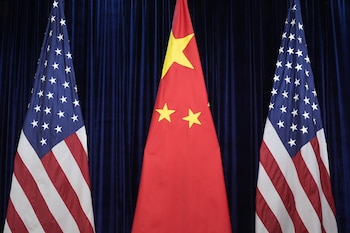
Esta negociación entre China y EE. UU., la primera de igual a igual, marca una diferencia con el periodo de predominio de Washington posterior al fin de la URSS. Sin embargo, no es lo único, ya que del mismo modo Groenlandia también marca una diferencia, ya que, aludiendo a criterios geopolíticos, se rechaza una soberanía danesa que provenía de la época colonial, al haber sido incorporada esa isla gigantesca a ese reino por el simple expediente de haber llegado a esas latitudes, tal como era habitual para los europeos en los siglos XVIII y XIX, lo cual tampoco debiera ser motivo de orgullo.
En esta nueva realidad, el éxito de EE. UU. está limitado por un escollo grande, cual lo es su política interna, toda vez que existe tal polarización y división, que nada asegura que el país pueda mantener su curso de navegación si es que cambia el gobierno, es decir, carece de la unidad nacional que abundó en el pasado y que le permitió ganar la guerra fría. Para la que es todavía la primera potencia es un problema, ya que la dictadura china enfrenta otros problemas, pero no este.
Aunque Xi no lo ha dicho públicamente, estoy convencido de que China ya se ha autoimpuesto una fecha para reemplazar a EE. UU. como la superpotencia del siglo XXI, el 1 de octubre de 2049, día emblemático en que se cumple el centenario de la República Popular China creada por Mao Zedong, hoy, una China nacionalista donde predomina Confucio sobre Marx.
Por lo demás, este nuevo escenario internacional está generando modificaciones en la balanza de poder individual de países y bloques, donde India, si decide continuar como rival de China, podría desplazar tanto a la Unión Europea, a Alemania o a Japón, como la tercera potencia relevante. Al mismo tiempo, en días de predominio de la geopolítica, yo no me sorprendería si la recuperación del diálogo entre Washington y Moscú conduce en un plazo no muy lejano a un viaje de un presidente estadounidense a Rusia con un objetivo similar, aunque al revés, del que hicieran en 1972 Nixon y Kissinger a China para reunirse con Mao y Zhou Enlai. Esa vez fue para evitar que China fuera dominada por los soviéticos después del caos de la Revolución Cultural, y a cambio se les abrió el mundo con las consecuencias por todos conocidas. La duda es que se le podría ofrecer a Rusia para desligarla de su actual alianza con China.
Creo en la necesidad de entender la profundidad de los cambios que se están intentando, para lo cual es imprescindible abandonar el criterio de barra deportiva con la cual se aplaude o, más habitual, se critica a Trump, por ser la cara visible. Muchos cambios van a permanecer, aunque los republicanos no sigan en el gobierno, en la misma forma como la política de Derechos Humanos sobrevivió al gobierno de Carter, y no solo le dieron un Premio Nobel, sino que fue su legado ante la historia.
En nuestros días ha aparecido el Consejo de Paz, por ahora para Gaza, pero, aunque no se diga de esta manera, tiene el objetivo no declarado todavía de reemplazar a la ONU en la misión para la cual fue creada, pero que por burocracia, corrupción o sesgo dejó de cumplir hace ya bastante tiempo, cual lo es la mantención de la paz.
Es un mundo donde suben nuevos actores (India) y bajan otros (Europa), y donde en contraste con la globalización hemos vuelto a las esferas de influencia, y en sustitución de las cadenas de suministro y producción, se busca que esos factores se acerquen al lugar geográfico inicial de las empresas, idealmente al territorio nacional. Para tal objetivo, los problemas geopolíticos son menores que en cambios similares del pasado. Sin embargo, nos sentimos inseguros porque no sabemos cuál es el puerto de destino. Al respecto, todavía sigue vigente la recomendación de los griegos para todo líder político, que la nave del Estado debe ser conducida por el timonel a buen puerto, tanto en mar calmo como en tempestad, y con Trump predomina lo segundo sobre lo primero, a lo que contribuye su forma de decir las cosas, aunque ello permite que con rapidez se logre que sus temas se impongan, ya que todos terminan opinando con relación a lo por él dicho.
Respecto de cuánto va a durar ese protagonismo, existe el precedente de la Guerra contra el Terrorismo que siguió a los atentados de las Torres Gemelas, y, aunque con escasa repercusión mediática se siga bombardeando al Estado Islámico, hoy más presente en áfrica que en el Medio Oriente, lo cierto es que después de la caótica retirada de Afganistán, esa guerra desapareció como símbolo de una época.
Ocho décadas después, EE. UU. intenta el reemplazo de las reglas aparecidas en 1945, lo que con cierta probabilidad no solo puede tener éxito sino también perdurar, aunque sin Trump, es posible que se pierda impulso, si es que el nuevo esquema no se convierte en leyes ni existe continuidad bipartidista en el Congreso. Por lo anterior, la recuperación del consenso y de la unidad de propósitos, es imprescindible para confrontar a un rival como China, que a su favor posee un poder económico que nunca tuvo la URSS.
No es opinión, sino geopolítica pura. Por lo demás, esa presencia dominante muestra en nuestros días, que, a diferencia del periodo anterior de predominio de la economía, donde Napoleón parecía tener razón al decir que el mundo temblaría cuando despertara China, esta vez, el gigante dormido que ha despertado parece ser Estados Unidos.
@israelzipper
Máster y PhD en Ciencia Política (U. de Essex), Licenciado en Derecho (U. de Barcelona), Abogado (U. de Chile), excandidato presidencial (Chile, 2013)
Asia / Pacific

 ECONOMIA2 días ago
ECONOMIA2 días ago¿La revancha de Don Chatarrín?: acuerdo Trump-Milei puede favorecer a Rocca ante el avance asiático

 CHIMENTOS3 días ago
CHIMENTOS3 días agoDesconcertada y sin la China Suárez: así reaccionó Magnolia tras el maltrato de un guardaespaldas

 INTERNACIONAL2 días ago
INTERNACIONAL2 días agoTop fiery moments as Democrats clash with Treasury Secretary Bessent in chaotic Hill hearings



